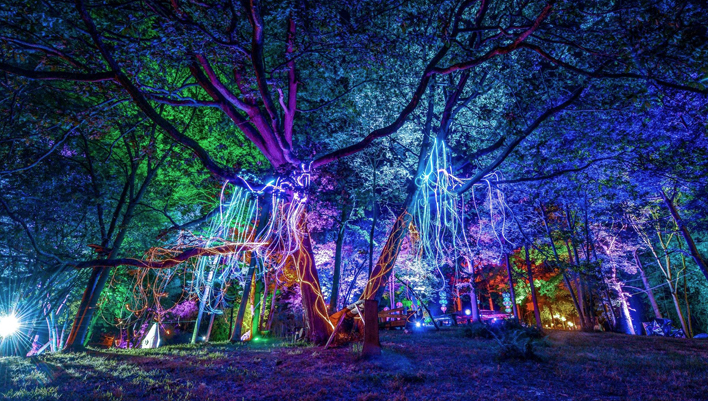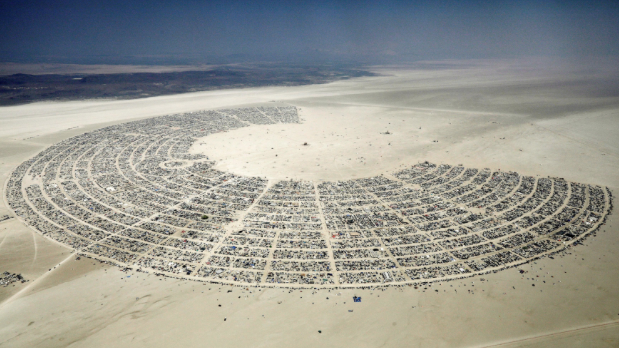Alternative Editorial: Intensely Personal Politics
Images below from Burning Man Festival, Nevada Desert
Another extra-ordinary week in the Emergence. If that sounds too other-worldly, or even pretentious, we’re happy to plead guilty. Much of what we encounter in seeking a genuine Alternative, is not what you might read about in your daily newspaper. And the claims we make about the possible agency of some of these initiatives might seem like wishful thinking in the light of the behemoths currently running the system.
But then we do – all of us – have the biggest problem in history to solve. With a ten-year window to change our destiny it’s going to take thinking outside of the box – or more accurately - outside of the mainstream. While many of the architects of our current dilemma are now trying to reform themselves in response to the climate emergency they are also trapped in the culture they created.
Just watch the continued breakdown of power at Westminster. Party self-interest rules, keeping politicians in thrall to their differences – and even between factions within their own parties – rather than to the crises we have in common. Some have proposed a government of national unity to deliver Brexit recently: but I have my doubts. How can you ask everyone to deliver something almost half the country voted against? And that continues to be discredited by too many sensible people?
South African government of National Unity 1994-1999
But imagine a government of Unity to overcome the ecological breakdown: a common goal that only very few people now refuse to acknowledge, even if they disagree on the means to achieve it. Unity might allow the complexity of the problem to be held, rather than implode as a series of binary issues, always preventing progress.
However, because that is highly unlikely, people are feeling justified in putting politics itself to the side as a failed project of power. When politics defeats itself, can it still claim to have agency? Particularly at this point in history, it’s more of a spectacle of our powerlessness – the story of how we have defeated ourselves.
The call for a new narrative that would pull people together to release a different kind of agency has become more than fashionable – it’s a bit of a clamour. George Monbiot mainstreamed the demand in his book Out Of The Wreckage when he made the claim that we humans are more collaborative than competitive creatures. Stephen Pinker’s two books – The Better Angel of our Natures and Enlightenment Now – attempt to tell the story of a consistently improving society, despite the problems that seize our day to day attention.
But in both cases, there was no alternative offered to the current mechanisms of change, that would help us rise to the emergency we face. Just a suggestion of incremental improvements – a better government, in Monbiot’s case; time and patience in Pinker’s.
At the next election it is very likely that we will be left with the same choice between more jobs and welfare on one side, and more freedom for business as usual on the other – but no clear way of beating the old divides that prevent us from progressing.
In contrast we’ve spent this week experiencing a number of different visions that would take Monbiot’s and Pinker’s stories of a better human towards quite different mechanisms of change. Whether the Transhuman vision of a beneficent Artificial Intelligence; the arts and culture vision of creative communities taking back control, or the Human Givens vision of self-authoring humans owning their own story of needs and resources.
Each one is an idea of individual and social inter-dependence that makes politics more personal. Power becomes something we participate in; agency is something we have to win on the inside first. And when we do that, we can make change happen in a more fractal way.
The principles of Burning Man Festival
Then yesterday we took part, for the second time, in Noisily Festival. For those who don’t know, that’s largely a gathering of ‘burners’: people who attended Burning Man, or similar transformative Festivals, or those who share their values and practices (we’ve covered this here). If this is new to you, it’s worth reading up on the creation of temporary, sacred spaces for Art as an expression of human creativity. In these events, psychedelics figure large as the human technology that liberates the dream of a massively potentialised future. Underpinning everything is a philosophy of response-able human behaviour and practice.
At Noisily, Lachie Gordon (featured here before) has curated an escape into a magical woodland kingdom, complete with artsy wooden stages and earthy designer loos. Dance and trance music thrums constantly. But mostly what you are witnessing is people talking and connecting, hanging out in distinctly soft, colourful, often theatrical clothing, living temporary, alternative lives.
Noisily Festival In The Woods
We took part in a session called The Future of Politics, located in the Mind, Body, Soul corner of the Festival. Ronan Harrington – founder of the Alter Ego gathering – hosted. Beginning with a very personal story of human vulnerability, Ronan invited us all to think of a new politics as arising more from uncertainty than certainty. Entering into the public space, in these days of digitally enabled chaos, should make us all question what ‘being right’ could possibly mean, coming from any one quarter. But our vulnerability, at least, connects us to a more human starting point.
Skeena Rathor - who was until recently a Labour councillor but is now a key figure in Extinction Rebellion – gave us that starting point. We heard her describe a painful journey: from relative ignorance about the seriousness of our ecological crisis, to a deep awakening to the reality. Her agony in being unable to guarantee a future for her three children was clear. And while XR is already achieving unprecedented progress in the global fight against breakdown, time has run out for any credible strategy within the current political settlement. In this scenario, Skeena asked us to ‘dare to believe’ in the power of our imagination - even if it is not clear yet, how that will manifest.
However, what I could sense in that audience was that unless there is some idea of how very differently power could be expressed, it’s hard for us to imagine change happening. If you’ve only ever seen politics as something you cannot influence, what good will your vision or intention do? And if the people and systems to which you surrendered your power proved to be catastrophically dysfunctional, what hope can you have of a better outcome in the future? Under these conditions, what’s the difference between imagination and fantasy?
In this trap, like trying to lift a table you are standing on, one option is to get off the table and try picking it up in a new way. I introduced the notion of citizen action networks – explained in detail in last week’s editorial – as a shift from hoping that the government will act, to newly investing in our personal and community power. If nothing else, that shift can give us all a field in which we can explore our own capacities.
People working together in towns, cities, even regions, can achieve some level of resilience that would prepare them for an inevitably deteriorating environment. But beyond self-defence, this kind of action can also create resources for building something better. Local food and energy solutions, new forms of relational care, a tangible local economy. A vibrant community identity, shared meaning and a common purpose.
If many towns and cities do the same, we have the best chance of changing minds at the national level. Traditional parties might change, as they try to gain the votes of those going their own, independent way. This “active localism” is a simple logic that we can grasp, even as we become desperate.
But probably far more potentially radical, is the effect of people – one by one – waking up to their own personal agency. Moving out of the zone of alienation and rejection of the mainstream and moving into relationship with people they live amongst. Through a growing relationship and trust, these people would provide the security and belonging they yearn for.
While many in our Noisily gathering could quickly grasp the idea of working together with those that share their values and lifestyles, they could also see how easy it is to exclude those who don’t. And only some are up for the long battle to find common ground with people in very different worlds of meaning.
But does integration mean we have to agree? Is community cohesion ever achieved by diversity being overcome? Or is it rather that we can do something together that puts our differences in perspective? The group of people who became the Independents for Frome included politicians from both Labour, Conservative and Lib-Dem parties. Their offer was to put those differences aside and represent the people of that town before any party.
With that idea in mind, it was much easier to think of our task as focusing on building, rather than discussing. We need to be able to get to work with whoever lives in our community, with the clear goal of modelling local success that might inspire others.
Burning Man community mechanisms
Lachie then spoke about Noisily itself as a core network of change makers, arising in any town or city, around whom others could build a citizen action network. Why could this temporary autonomous zone not be taken out of the woods and into a community near you, kickstarting something very alternative to the current power structure?
Not as a group of self-interested escapees from the mainstream—but as the carriers of a new relationship with the land and each other, in service to all the people in their real-life community?
Why could the spectacle of Burning Man not happen in the heart of Leeds or Birmingham? Building a work of art that captures the spirit of that city, with anyone who wants to be involved? Can we imagine all the spaces that might be opened to support that work and discuss its execution – spaces in which a citizen action network might take shape?
It’s a vision that got a good cheer from the Noisly audience! So watch out for the Noise Makers CAN opening up in a town near you.
Stepping back slightly from Noisily, we can see their take on the CAN as mirroring many of the others we regularly cover on these pages. Transition Towns honours the I, We, World. Co-operatives emphasize community organising. Think also of all the bio-psycho-social-spiritual inputs into what constitutes health. Rob Hopkins (and many others) champion the role of imagination. Cultural and arts institutions believe in the power of the arts. Each of them working below the party political divisions, in service to the whole of the community.
At the heart of it is an understanding of relationship as both the need and the resource – the question and the answer to the problems we face. A challenge that each one of us can take personally, and take on individually. In this way, each one of us can be the revolution.







